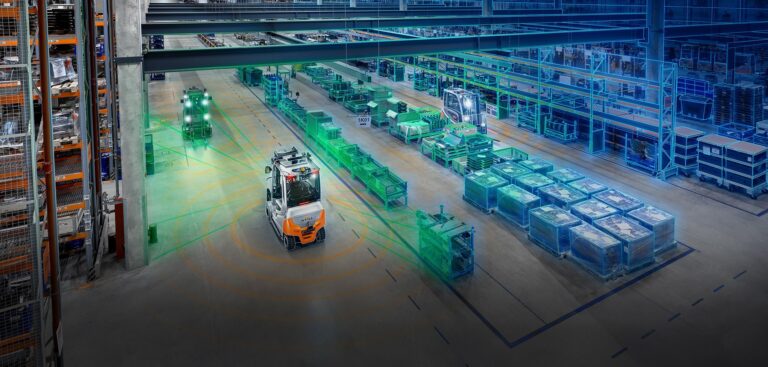A new research project, ‘ARIBIC’ (Artificial Intelligence-Based Indoor Cartography), is set to investigate how data sourced from within a DC could help to create a real-time digital twin of a warehouse or a production environment. The initiative is being led by KION Group (Linde, STILL, Dematic, etc) with co-operating partners including LeddarTech, Karlsruhe Institute of Technology (KIT) and the STARS Lab at the University of Toronto.
Automated guided vehicles are already being used on a large scale in warehouses and production facilities today. With modern sensor technology such as laser scanners and cameras, they find their way safely through racks, production lines, and warehouses. In the process, they continuously generate a considerable amount of data about the environment in which they move. However, this data is usually not yet systematically processed and lies fallow. What if the full potential of these bits and bytes could be exploited?
“Today, many industrial companies apply so-called post-digitisation of their production environments and warehouses,” said Dr Joachim Tödter, Senior Director Technology & Innovation at the KION Group. “However, this only captures a snapshot. The research results of the ARIBIC project go further by enabling continuous data evaluation.”
The data generated by the sensor system is sent to the vehicle, processed there, and sent to the ARIBIC cloud platform. The sensor data is then processed further in the cloud. The advantages of this solution are obvious: firstly, the user receives live information about object locations via tracking and tracing. This information makes it possible, for example, to simulate the routes of vehicles and in doing so optimise processes in the warehouse and production. At the same time, intelligent digital services offer the advantage that anomalies such as a blocked route are detected and reported. The consistent evaluation of the data shall ultimately lead to a warehouse’s entire structure being optimised and adapted.
“ARIBIC provides an important progress in adding computational perception capabilities,” commented Hamid Montazeri, Senior Vice President, Software & Digital Solutions Development at KION Group subsidiary Dematic. “They leverage edge intelligence and open the door to many applications ranging from more efficient design of flexible automation and mobile robotic operations for the warehouse of tomorrow to inspection and detection of warehouse material placement and distribution that is critical to workflow optimization for many logistics operations.”
The project is scheduled for completion in Q4 of 2023.







